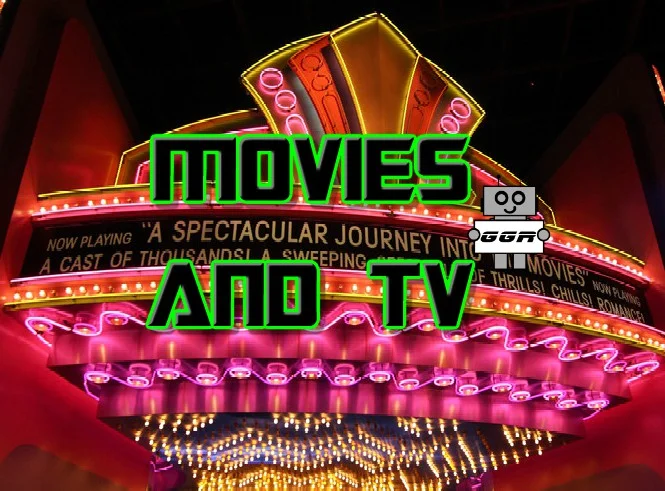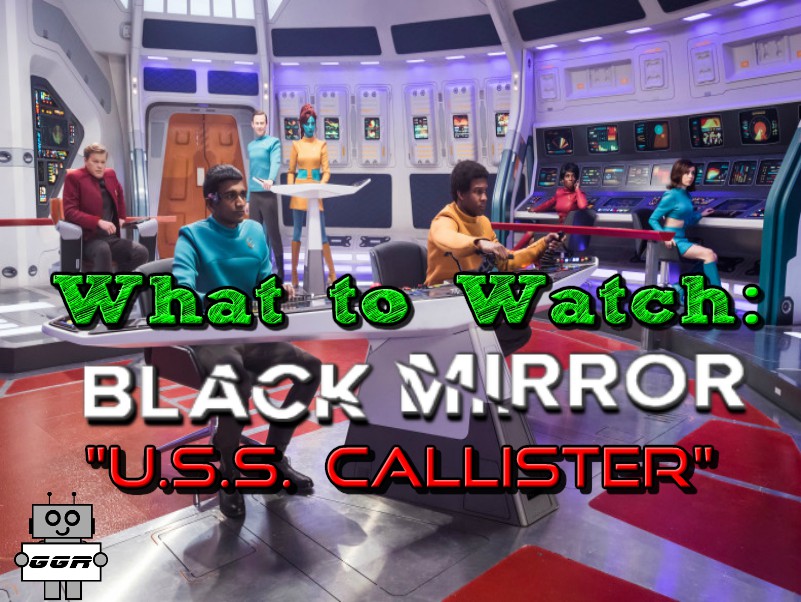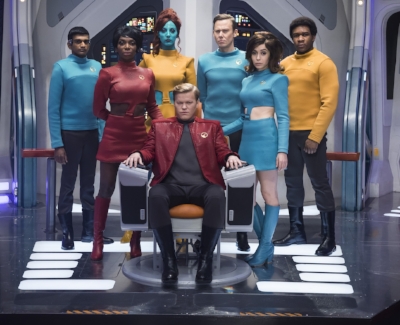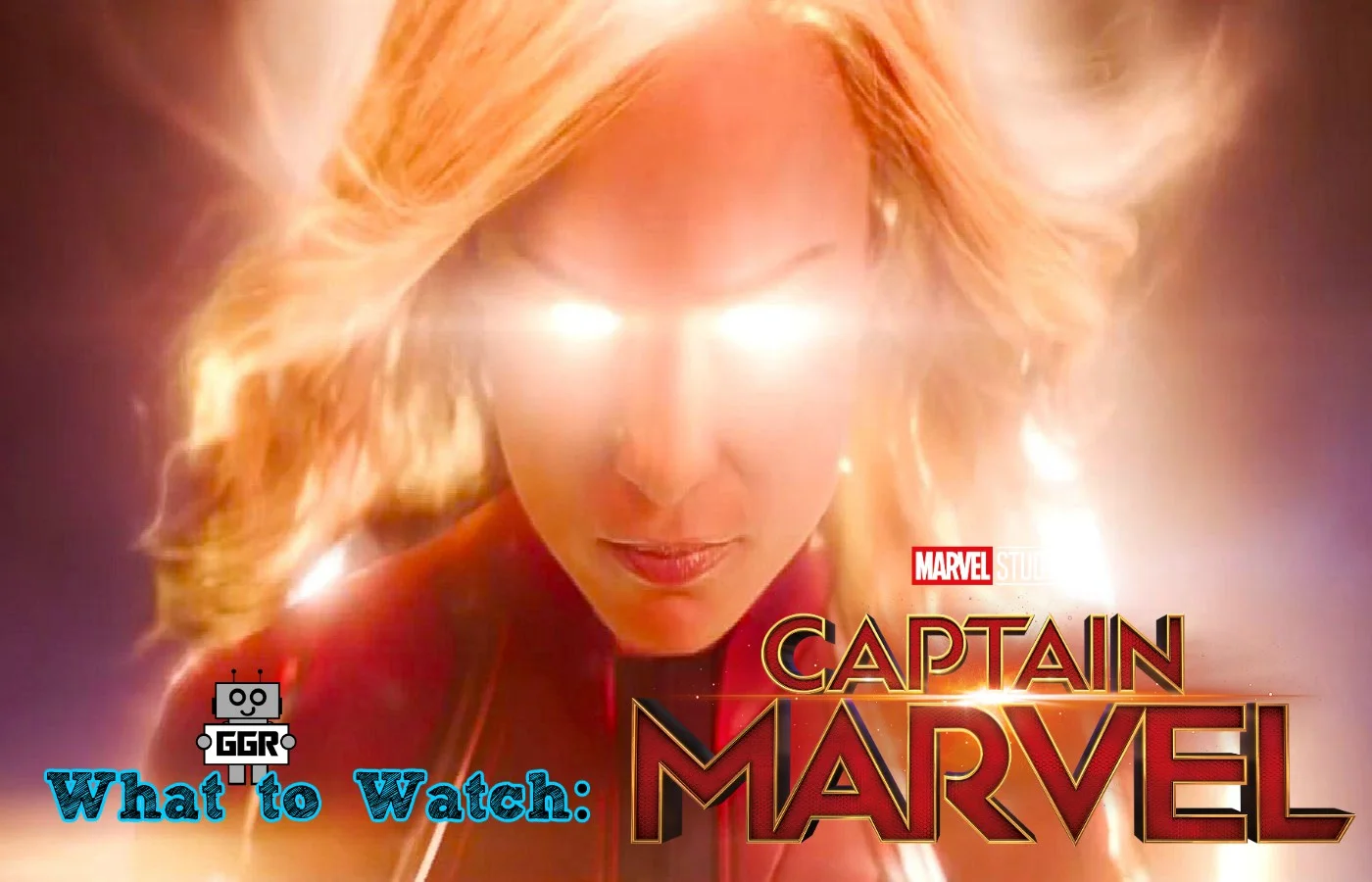What to Watch: Black Mirror "U.S.S. Callister"
originally published January 19th, 2018 on www.rockdeeprogueradio.com Editor-in-Chief's Log, Stardate 47634.44
If you have any social media accounts, then you have seen your friends, colleagues, family members, neighbors, clergy, pets, etc all raving about this show on Netflix, Black Mirror. It's become quite the phenomenon. The series examines modern society, particularly the dark side to some of the technologies our lives afford us. They are set in a near-future or alternative present timeline, more often than not with a dark tone. It is a modern-day take on the classic horror anthology series made famous by such predecessors such as The Twilight Zone, The Outer Limits, or Tales from the Crypt. What's not to like, right?
Yours truly was interested in the series and gave it a shot last year. I was immediately turned off. It wasn't scary, it wasn't creepy, in fact, it pissed me off. I watched the Season 3 premiere Nosedive starring Bryce Dallas Howard. To sum up this sub-par episode, in this "eerie possible future," your social media rating (1-5 stars) determines your social status. Want to live in the awesome neighborhood? Got to have a 4 rating. Want to be accepted into the coolest parties at the nicest country clubs? 4.25 or better. But life shouldn't be lived like that, right? You shouldn't have to fake smiles and platitudes in order to make a name for yourself. Fake nice isn't actually nice, and social media isn't the basis for our lives. This concept was the crux of this episode and it was BLUDGEONED over your head repeatedly. I like my satire and social commentary not so obvious and repetitive. It was way too on the nose and got old, fast.
OK, Opie's daughter, we get it. social media is bad and stuff.
I was done with this series and was content to let it waste away in the ether of the internet in which it existed. Then, as often happens, my friends convinced me to give it another chance. They won me over with a teaser of season 4, which opened with a Star Trek spoof episode. I'm a huge Trekkie so I had to give Black Mirror another chance. I was handsomely rewarded.
Black Mirror
seasons: 4
Where to watch: Netflix
One of the cool aspects of Black Mirror is that each episode is self contained. You don't need to watch the preceding episodes to understand what is going on, much like it's spiritual predecessor The Twilight Zone. To that end, my bad experience I had with Nosedive was an outlier, not a trend. I re-started the series with the Star Trek inspired, season 4 premiere U.S.S. Callister.
"To boldly go where a bunch of other people have probably gone before..."
The episode follows Robert Daly (Jesse Plemons, Friday Night Lights, Fargo Season 2), a reclusive but gifted programmer and co-founder of a popular MMORG, Infinity. Robert's real life is sad and you feel for him: he is unappreciated at work and often laughed at even though it is stated that without his genius, Infinity wouldn't be nearly as popular or possible. He takes out his frustrations by simulating a Star Trek-like mod that he uses on his home build of Infinity where he is the captain of the U.S.S. Callister. No big deal, right? We all gotta blow off some steam sometimes! But here's that patent-pending Black Mirror dark twist: Daly uses his co-workers' DNA that he swiped from water bottles, lollipops and coffee lids to create digital clones of them without their permission. Even worse, those digital clones have all the memories, emotions, thoughts and fears of their real life counterparts. They KNOW that they're trapped in this world which makes it all the more terrifying. This makes the missions they go on are far from voluntary.
This episode is more of a commentary on toxic masculinity, the often violent/sexist gaming culture and how these two tend to coexist. Robert is ultimately not the friendly-but-shy-nerd who just needs to be given a chance that we see so often in TV and movies. He instead is an amoral psychopath more interested in acting out his fantasies of dominating and controlling people. Since these clones have the all the memories and feelings of their source material, it takes on a very creepy vibe. His abilities as a programer are impressive but the way he wields the God-like power over his "party" in the worst ways imaginable is frightening. What seems like could be the best LARP ever gets twisted and warped when it's revealed that all of these digital clones can be mutated, mutilated, deformed, and tortured by Daly at the snap of his fingers. In fact, many of the digital clones are here because Robert had some sort of real life interaction with them that he was not pleased with.
(**SPOILER ALERT** The next paragraph reveals a very specific moment. Do not read if you want to be surprised by a crucial story piece in this episode. Seriously, you've been warned.)
Robert's real-life business partner, James Walton (Jimmi Simpson, Westworld) is brought into the world as well. Robert never confronts James about how he feels slighted, instead dominating and controlling his clone in the digital world. In order to control James in Infinity, Robert digitally clones James' son and ejects him out of an airlock with the future threat of "if you don't do what I ask of you, I will do this again and again." Daly knew that the character had all his memories of his child, he knew that destroying him in front of him would break him... and he enjoyed every moment of this in sadistic fashion. This particular aspect of the story changed things as you realized that Daly has created his own version of Hell for these clones yet for Daly, it is Heaven. This part of the episode was a gut punch and really upped the ante.
(***SPOILERS END*** it is now safe to continue reading :-D)
You go from feeling bad for the poor, misunderstood computer programmer to hating his guts. This is a different kind of villain than you would expect from years of TV and movie viewing, Daly's character makes you uncomfortable with the way he treats these digital slaves, which is why U.S.S. Callister is so enjoyable.
"My readings are telling me that I'm the Captain, the women are scantily clad...so they all want me, right? That's how this works!"
Here is the important distinction between this episode and Nosedive: subtlety. U.S.S. Callister shows you that this particular stereotypical misunderstood nerd is much worse than that, he's the reflection that so many of us become online: the worst, most self-absorbed, narcissistic versions of ourselves. We get so caught up in this perceived power, we lose touch of how this technology is meant to enrich our lives.
I was worried that this episode would be too much of a rip on Star Trek. Not that I am an overly sensitive fan of the series or anything, but making fun of something I love without context or understanding could have been irritating, but Black Mirror did nothing of the sort. This really wasn't as spoofy as say, Galaxy Quest. By the way, Galaxy Quest is a hilarious riff on the original Star Trek series. It more used a fictional device for Daly's fandom and his "safe place," even though it is nothing of the sort for his unwilling crew. For the most part, U.S.S. Callister is more of an homage to Star Trek than anything else, but it does take a few precise jabs at the series. Robert Daly's captain role is an obvious knock on the womanizing, bad-guy-punching, always-wins-the-day Captain Kirk. While progressive for its inclusion of women, persons of color and the message that all races and sexes could work together for a peaceful coexistence, there was also Star Trek's lasting legacy that white men would always lead the way. The series has made steps to evolve with the times, but for every female lead or P.O.C. main character, there are moments like these that set the series back:
"Oh, I have to change into my space suit." Really? Come on, Star Trek...seriously? You're supposed to be a science fiction series about what humanity can accomplish when they set aside their differences and work together, not an action film series where you pander to teenage boys and their libidos in hopes of selling tickets! Come on guys!
For a series that is now in it's 50s, Star Trek has evolved its sensibilities and found ways to integrate new and old fans alike. For the most part, the fandom is one of the most tolerant, accepting groups out there. They truly believe in the ideals of the show and focus less on the darker sides of it, which Black Mirror certainly examines with it's unique magnifying glass.
I really enjoyed U.S.S. Callister. It had the patented Black Mirror twist that so many of it's fans yearn for but had an uncharacteristic glimmer of hope near the end of the episode. More importantly, it brought me back into this series. After the Bryce Dallas Howard episode I was perfectly content with ignoring this series. I'm certainly glad I gave it another chance. In fact, as I watch more episodes, I will review them as well!
Black Mirror Season 4 Episode 1 U.S.S. Callister gets 4 out of 5 "swear-to-God-it's-not-the-Enterprise-starships." Good enough to get me back into this series. Well done, team!
different ship, no way it's a Trek reference :)
Keep coming back to GGR for more reviews and "What to Watch" recommendations.

















Chelsea House Reviews “Song of the Sea.”